情态动词重点总体复习[下学期]
图片预览

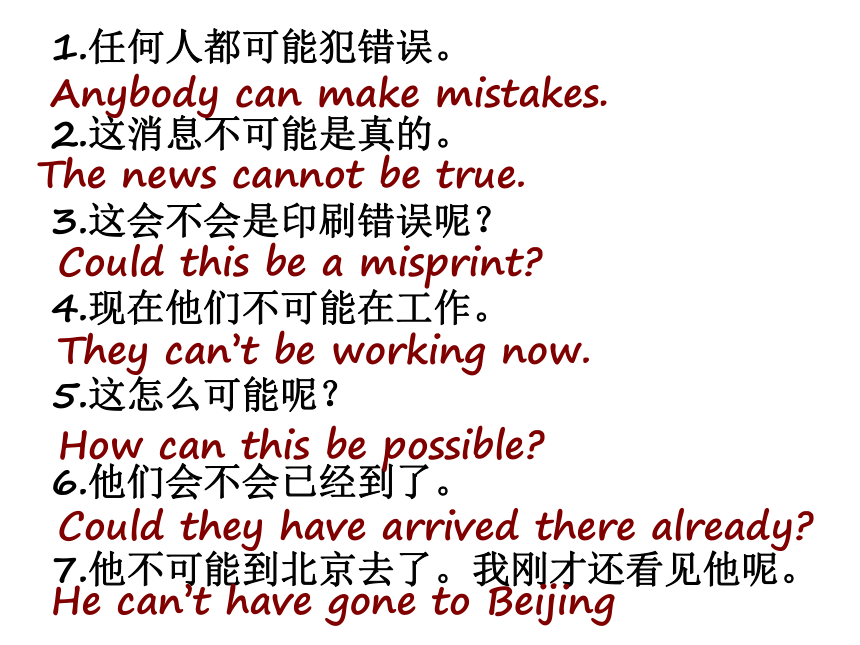
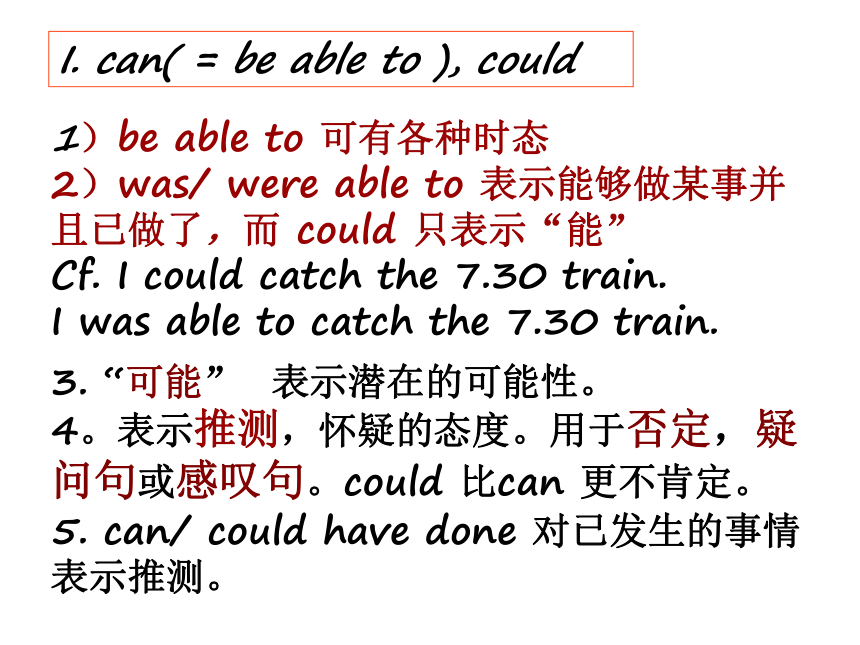
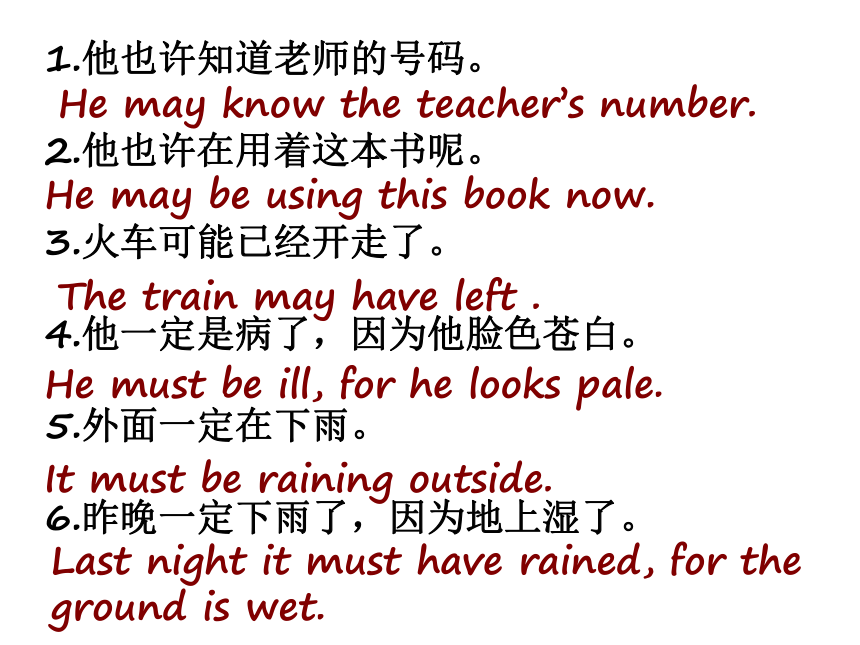
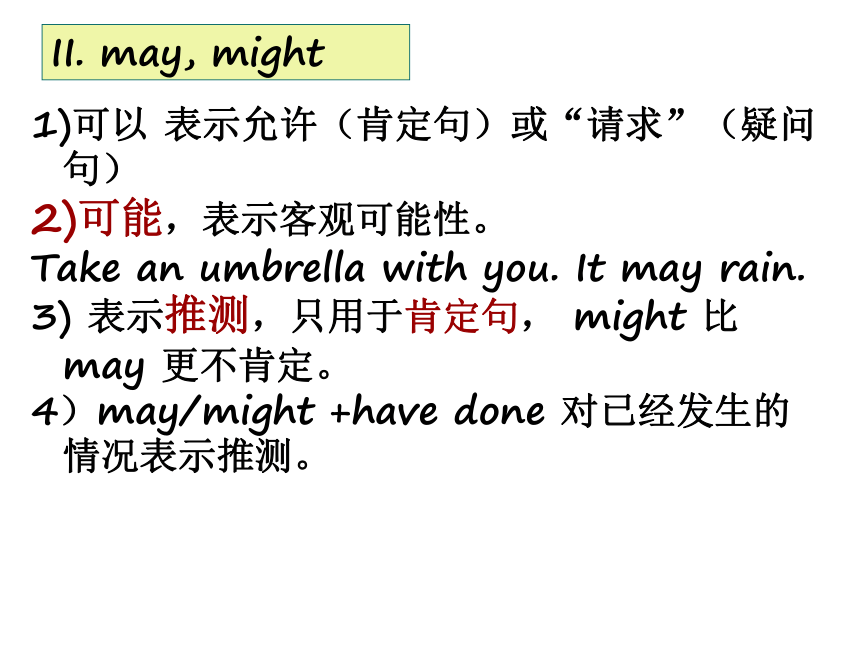
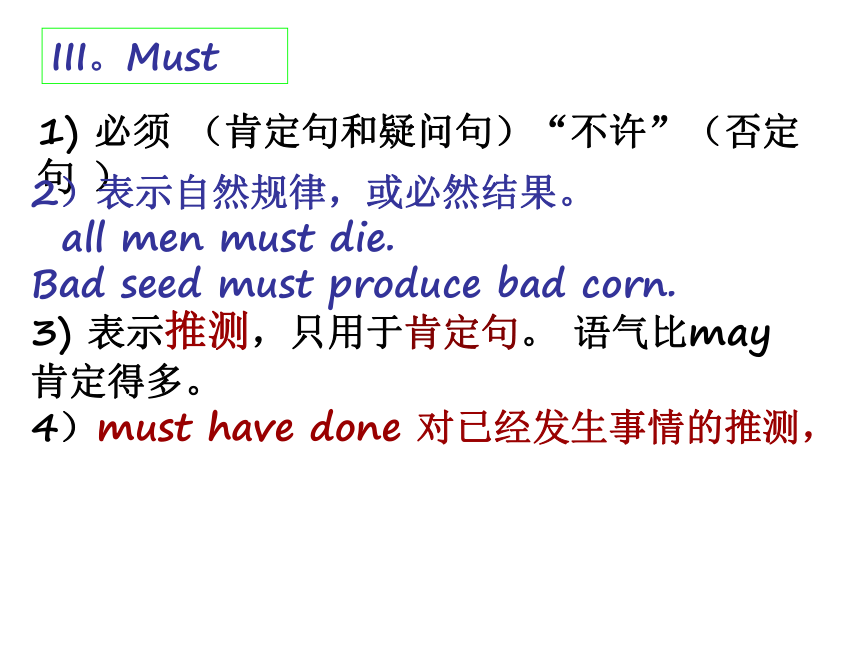
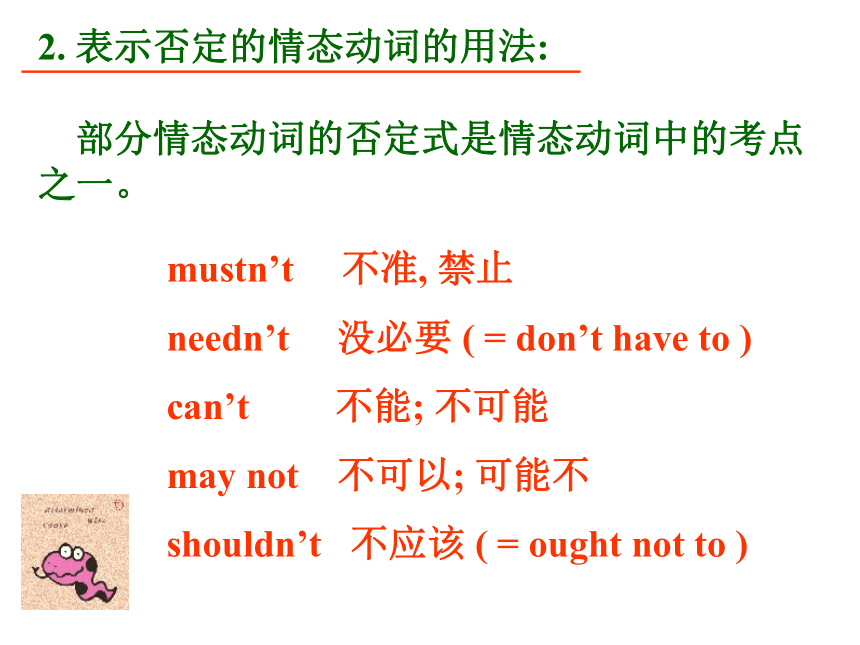
文档简介
课件16张PPT。任何人都可能犯错误。
这消息不可能是真的。
这会不会是印刷错误呢?
现在他们不可能在工作。
这怎么可能呢?
他们会不会已经到了。
他不可能到北京去了。我刚才还看见他呢。Anybody can make mistakes.The news cannot be true.Could this be a misprint?They can’t be working now.How can this be possible?Could they have arrived there already?He can’t have gone to BeijingI. can( = be able to ), could 1)be able to 可有各种时态
2)was/ were able to 表示能够做某事并且已做了,而 could 只表示“能”
Cf. I could catch the 7.30 train.
I was able to catch the 7.30 train. 3. “可能” 表示潜在的可能性。
4。表示推测,怀疑的态度。用于否定,疑问句或感叹句。could 比can 更不肯定。
5. can/ could have done 对已发生的事情表示推测。 他也许知道老师的号码。
他也许在用着这本书呢。
火车可能已经开走了。
他一定是病了,因为他脸色苍白。
外面一定在下雨。
昨晚一定下雨了,因为地上湿了。He may know the teacher’s number.He may be using this book now. The train may have left .He must be ill, for he looks pale.It must be raining outside.Last night it must have rained, for the
ground is wet.II. may, might 可以 表示允许(肯定句)或“请求”(疑问句)
可能,表示客观可能性。
Take an umbrella with you. It may rain.
3) 表示推测,只用于肯定句, might 比 may 更不肯定。
4)may/might +have done 对已经发生的情况表示推测。III。Must1) 必须 (肯定句和疑问句)“不许”(否定句 )2)表示自然规律,或必然结果。
all men must die.
Bad seed must produce bad corn.
3) 表示推测,只用于肯定句。 语气比may 肯定得多。
4)must have done 对已经发生事情的推测,2. 表示否定的情态动词的用法:
部分情态动词的否定式是情态动词中的考点
之一。
mustn’t 不准, 禁止
needn’t 没必要 ( = don’t have to )
can’t 不能; 不可能
may not 不可以; 可能不
shouldn’t 不应该 ( = ought not to )7. You ______ return the book now. You can
keep it till next week if you like.
A. can’t B. mustn’t C. needn’t D. may not
8. Johnny, you ______ play with the knife, you
______ hurt yourself.
A. won’t ; can’t B. mustn’t ; may
C. shouldn’t ; must D. can’t ; shouldn’tC B 9. --Will you stay for lunch?
--Sorry, _____. My brother is coming to see me.
A. I mustn’t B. I can’t
C. I needn’t D. I won’t
10. --May I pick a flower in the garden?
-- ________.
A. No, you needn’t B. Not, please.
C. No, you mustn’t D. No, you won’tB C 情态动词:shall, will 的多种意义: shall / will+ 动词原形: * shall 可表示必须、命令、 警告或征询意见. * will 可表示意愿、常出现的动作、在疑问句
中表示请求和建议.* 均可表示将来。 过去时为 should, would.3.You shall be sorry for what you have done.
He shall get what he wants.
You shall not leave your post this afternoon. 警告允诺 警告4. 情态动词短语的使用:
would like to do…
would rather do…
would rather + 从句
would prefer to do...
had better do...改错:
1. Would you like having some tea?
2. I’d prefer going to the lecture this evening.
3. I’d rather you to go to the meeting.
4. He would rather to die than to give in.
5. You’d better to have your hair cut today.Would you like to have some tea?I’d prefer to go to ...… you went to ...He would rather die than give in.You’d better have ...表 推 测 不同的“肯定”程度可按下列层次排列:
He is at home. (事实)
He must be at home.(非常肯定的推断)
He could be at home.(很可能)
He ought to be at home.(很可能)
He may be at home.(仅仅可能而已)
He might be at home.(或许, 非常不确定)
He might not be at home.(也许不在家)
He may not be at home. (比might可能)
He couldn’t be at home.(很可能不在家)
He can’t be at home.(一定不在家)
He isn't at home.(事实)
表示推测——情态动词的重要用法.肯定的推测
可能的推测
否定的推测
疑问的推测must 对将来 对现在 对过去情态动词may, might can’t,
couldn’tcan, could + V. + V. + have done
常见must be + be doing + V. + V. + have done
+ be doing
可以用not表示“可能不”
+V. + V. + have done
+ be doing+ V. + V. + have done
+ be doing
这消息不可能是真的。
这会不会是印刷错误呢?
现在他们不可能在工作。
这怎么可能呢?
他们会不会已经到了。
他不可能到北京去了。我刚才还看见他呢。Anybody can make mistakes.The news cannot be true.Could this be a misprint?They can’t be working now.How can this be possible?Could they have arrived there already?He can’t have gone to BeijingI. can( = be able to ), could 1)be able to 可有各种时态
2)was/ were able to 表示能够做某事并且已做了,而 could 只表示“能”
Cf. I could catch the 7.30 train.
I was able to catch the 7.30 train. 3. “可能” 表示潜在的可能性。
4。表示推测,怀疑的态度。用于否定,疑问句或感叹句。could 比can 更不肯定。
5. can/ could have done 对已发生的事情表示推测。 他也许知道老师的号码。
他也许在用着这本书呢。
火车可能已经开走了。
他一定是病了,因为他脸色苍白。
外面一定在下雨。
昨晚一定下雨了,因为地上湿了。He may know the teacher’s number.He may be using this book now. The train may have left .He must be ill, for he looks pale.It must be raining outside.Last night it must have rained, for the
ground is wet.II. may, might 可以 表示允许(肯定句)或“请求”(疑问句)
可能,表示客观可能性。
Take an umbrella with you. It may rain.
3) 表示推测,只用于肯定句, might 比 may 更不肯定。
4)may/might +have done 对已经发生的情况表示推测。III。Must1) 必须 (肯定句和疑问句)“不许”(否定句 )2)表示自然规律,或必然结果。
all men must die.
Bad seed must produce bad corn.
3) 表示推测,只用于肯定句。 语气比may 肯定得多。
4)must have done 对已经发生事情的推测,2. 表示否定的情态动词的用法:
部分情态动词的否定式是情态动词中的考点
之一。
mustn’t 不准, 禁止
needn’t 没必要 ( = don’t have to )
can’t 不能; 不可能
may not 不可以; 可能不
shouldn’t 不应该 ( = ought not to )7. You ______ return the book now. You can
keep it till next week if you like.
A. can’t B. mustn’t C. needn’t D. may not
8. Johnny, you ______ play with the knife, you
______ hurt yourself.
A. won’t ; can’t B. mustn’t ; may
C. shouldn’t ; must D. can’t ; shouldn’tC B 9. --Will you stay for lunch?
--Sorry, _____. My brother is coming to see me.
A. I mustn’t B. I can’t
C. I needn’t D. I won’t
10. --May I pick a flower in the garden?
-- ________.
A. No, you needn’t B. Not, please.
C. No, you mustn’t D. No, you won’tB C 情态动词:shall, will 的多种意义: shall / will+ 动词原形: * shall 可表示必须、命令、 警告或征询意见. * will 可表示意愿、常出现的动作、在疑问句
中表示请求和建议.* 均可表示将来。 过去时为 should, would.3.You shall be sorry for what you have done.
He shall get what he wants.
You shall not leave your post this afternoon. 警告允诺 警告4. 情态动词短语的使用:
would like to do…
would rather do…
would rather + 从句
would prefer to do...
had better do...改错:
1. Would you like having some tea?
2. I’d prefer going to the lecture this evening.
3. I’d rather you to go to the meeting.
4. He would rather to die than to give in.
5. You’d better to have your hair cut today.Would you like to have some tea?I’d prefer to go to ...… you went to ...He would rather die than give in.You’d better have ...表 推 测 不同的“肯定”程度可按下列层次排列:
He is at home. (事实)
He must be at home.(非常肯定的推断)
He could be at home.(很可能)
He ought to be at home.(很可能)
He may be at home.(仅仅可能而已)
He might be at home.(或许, 非常不确定)
He might not be at home.(也许不在家)
He may not be at home. (比might可能)
He couldn’t be at home.(很可能不在家)
He can’t be at home.(一定不在家)
He isn't at home.(事实)
表示推测——情态动词的重要用法.肯定的推测
可能的推测
否定的推测
疑问的推测must 对将来 对现在 对过去情态动词may, might can’t,
couldn’tcan, could + V. + V. + have done
常见must be + be doing + V. + V. + have done
+ be doing
可以用not表示“可能不”
+V. + V. + have done
+ be doing+ V. + V. + have done
+ be doing
